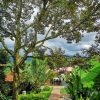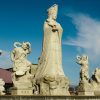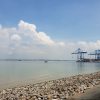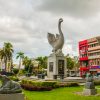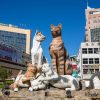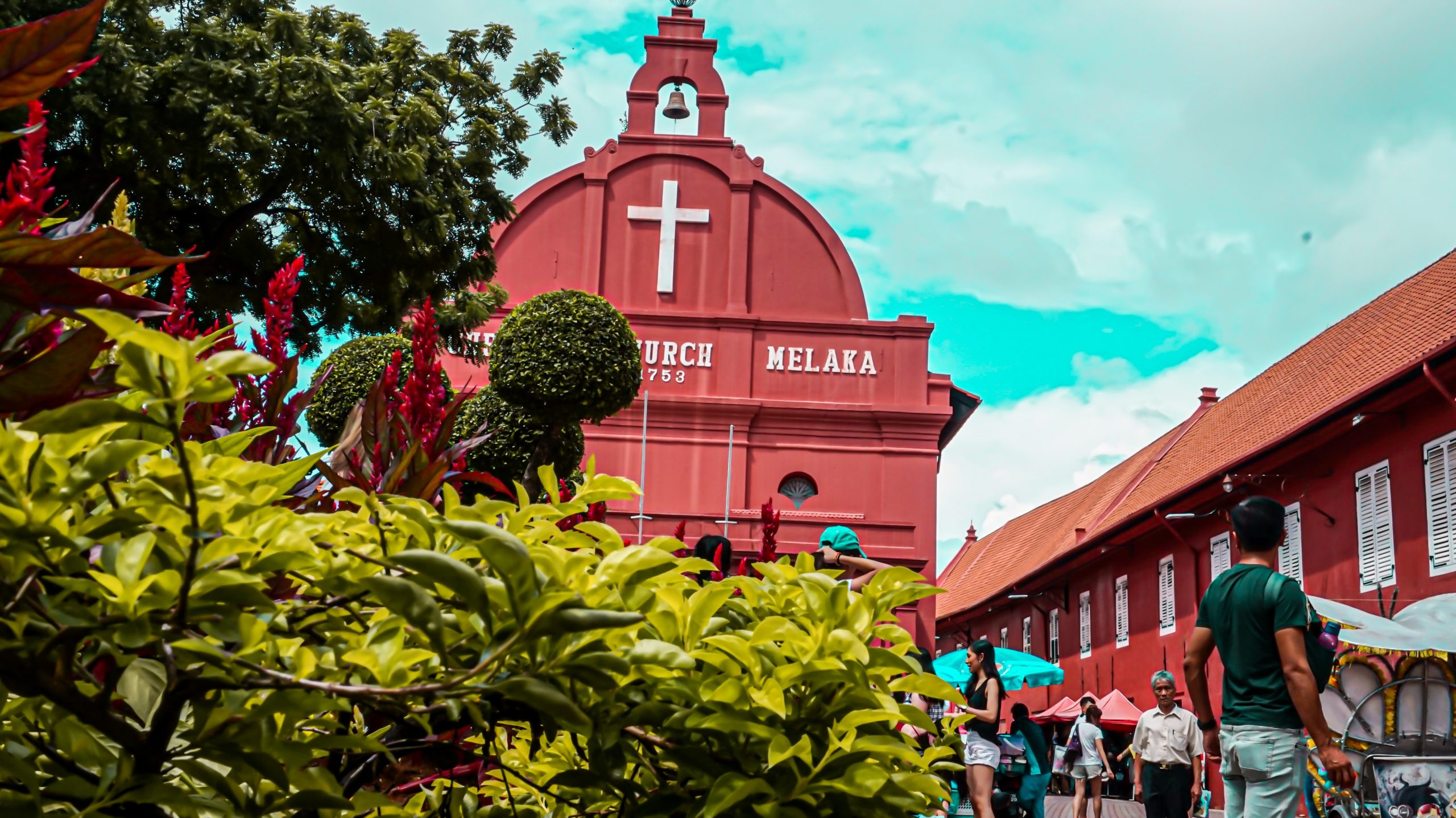
Baba Sohan Singh: Never fails to attend to people
Published on August 29, 2016 | by asiasamachar.com
1972: As the cortege wound its way to Melaka for the final rites, at every town people flocked in large numbers to have a last look and to pay their last respects to a man whom they loved and adored from the bottom of their hearts.

By Kabal Singh (Penang)
SANT SOHAN SINGH JI (Ude Singh at birth) is the most venerated and revered Sikh religious personality in Malaysia. His respect and esteem among Sikhs in Singapore, Thailand, South East Asia and even in India, especially in Punjab has been in no way less.
His six—foot stature, glowing chubby countenance, flowing long beard, soft spoken speech, purportly words, benign fatherly counsel, simple, humble ecclesiastical living and saintly poise endeared him to the vast following that he always enjoyed.
Even after his demise, the multitudes of Shardhalus (followers) who gather from far and near, in Melaka, to attend the annual commemorative prayers, held in his memory, without fail in May — a function organised by the Sant Sohan Singh Ji Melaka Memorial Society, With the support and co-operation of Gurudwara Sahib, Melaka and the Sangat (holy congregation) – is testimony of the great devotion and veneration that the Sikhs, in the region, had and have for the portly Saint, Sant Baba Ji.
Sant Baba Ji was also held high in regard by Buddhist, Muslim, Hindu, Christian and other co—religionists. He is on record to have attended their functions and they were invited to address Sikh gatherings which they uncompellingly accepted. For Sant Baba Ji there were no social and cultural barriers. He had transcended them all!
His humble beginning (in 1902) in a small village in Bathinda, was followed by a traditional upbringing, whereby he was placed at a Dera to learn Punjabi and the fundamentals of religion. In a short time, Sohan Singh, a name popularly acquired because of his handsome features (sohana = handsome) qualified as a Pathi (reader of the holy scriptures) and picked up the basic fundamentals of Kavishari (poetry composing).
His strapping tall physique made him a popular figure and an automatic leader among the youths. As such he took up and excelled, nay became an exponent in Gatika (an art of self— defence using a staff).
His (Sant Ji’s) advent into Malaysia (then Malaya) was not of his own choosing. It was more political, in a way. Baba Ji’s inclinations for religious reforms got him deeply involved in the GURUDWARA REFORM MOVEMENT. Many, mostly youths, suffered death or physical injuries at the hand of the oppressors and to save him a similar fate, he was hurriedly packed off to Malaysia with his sister’s son-in-law, Nanta Singh (a policeman stationed at Seremban), who had incidentally revisited Punjab.
In Malaysia, as he had hardly much to do, he started to write Kavishari and as was the practice, read his Kavishari in Gurudwaras to the delight of the Sangat (congregation). Soon he was in demand as a popular speaker at Sikh religious functions.
His fame as a Kavishar (poet) spread near and far. It reached the esteemed Sant Hari Singh, who was greatly impressed with Baba Ji’s potential. Sant Hari Singh blessed the young and budding poet and encouraged him to rise to greater heights. Example of his Kavishari can be found in the book ‘SAFAL JIWAN SANT SOHAN SINGH JI’ published in Punjabi by Sant Sohan Singh Ji Melaka Memorial Society.
Consequently, as if drawn by the Hand Of Providence, Baba Ji developed an intense desire to do SEWA (service to the Guru and mankind) and his growing piety took a firm grip on his disposition. Baba Ji emerged from then on as a completely changed personality.
What better way to serve than to be a Granthi (priest)? Apparently Baba Ji became a Granthi around 1927, at the age of twenty-five, at Gurudwara Sahib, Melaka. Besides being dedicated and imbued with Sewa, an expected lofty trait of any GuruSikh, Baba Ji assiduously pursued research and deep study of Gurbani (Sikh Holy Scriptures) and Ethaas (Sikh history) and in no time won the adorable respect of the people who referred to him as a Giani and progressively accepted him as a Mahagiani. Still later on (since sometime in 1932) Baba Ji was called Sant Baba Ji a rare honour which exonerated his expanding eminence.
Baba Ji’s spiritual and religious achievement attained such heights that he came to be truly venerated as the Saint or Maha Purkh – one who stresses unity of God and inner spiritual life, casts off vain attachments, repeats God’s Name day and night, has humility of temper, prays for the good of humanity at large, sympathises with those afflicted and suffering and loves one and all.
Evidently all these attributes, and still many more, were discernible in Sant Baba Ji, thus justifying the honorific of Maha Purkh (a great being) bestowed fondly upon him by his ardent followers.

BOOK COVER PHOTO CAPTION, p195
The photo on the cover was taken sometime in the early 1960s, in front of the Sikh Temple, Kluang, Johore. FRONT ROW (seated) from left to right: Giani Gian Singh (Kluang), S. Mehar Singh (Muar), Giani Gurdit Singh (Iohor Bharu), S. Amar Singh Das (Batu Pahat), Giant Dyal Singh (Segamat), Bhai Pall Singh (Kluang) Author’s father, S. Ishar Singh (Rengam). BACK ROW (standing) fiom left to right: S. Jaswant Singh (Batu Pahat), S. Ranjit Singh (Kluang), S. Tarlok Singh (Kluang), S. Jarnail Singh (Kluang), S. Kartar Singh (Kluang), S. Kahar Singh (Kluang), S. Dhana Singh (Kluang) and S. Gurdial Singh (Kluang). Kneeling down: Kaka Charan Singh (Kluang)
Such personalities are few and far between. I quote Guru Arjan Dev Ji: “If in the world the best are to be found, Very, very rare are they”.
Sant Ji never disappointed his Shardhalus and travelled from Melaka to far away places, to Singapore, Penang, Pahang, Kelantan and Perak, at the behest of his followers. He kept this practice going until in the later stages of his life when his health did not permit it. But then his Shardhalus provided Sant Ji with air tickets and he never let them down. Such was the mutual love!
His charismatic personality and love for the ordinary people acted like rennet upon milk, to kindle in the hearts and minds of Sikhs the fire of earnest devotion towards their Gurus and religion.
Baba Ji never failed to attend to the calls of his people and to take unto himself the hardships of others, gave hope and shelter to destitutes and provided unprecedented dynamic religious spiritual and political leadership to the Panth.
Wherever he went and whenever he talked his canny charisma never failed to draw huge crowds, who flocked to him and sought to touch his feet or to be blessed by him.
Baba J i was completely devoid of pride and always considered himself inadequate for the respect and honour shown to him. His foremost and sole desire was to be humble and remain a nonentity, an inconspicuous person.
When asked by biographers, intending to write his life and mission, for advice and information, Baba Ji pleading would put them off by saying, “There’s nothing in me or in my life which is worth penning. Only the lives of Maha Purkhs are worthy of mention”. This was greatness in humility, a significant trait of a true GuruSikh. Sant Ji never for once deviated from this stance.
His exposition of Gurbani was generally simple and fundamentally directed at and intended to be understood by the ordinary people. He was not pragmatical!
Baba Ji stressed the need for people in general and parents in particular to get their children to read, write and study Punjabi (in the Gurumukhi text) for it was the only medium available to Sikhs to perceptualize and understand Gurbani written in Gurumukhi.
In his lifetime, he met and discoursed with several eminent scholarstic and spiritually matured personalities like Sant Teja Singh, Dr. Gopal Singh, Dr. Ganda Singh and several renouned Sants.
Baba Ji was patron to several institutions and played a major role in the publication and distribution of scholarstic works of esteemed Sikh poets and writers, for example, Bhai Nand Lal Goya.
When a follower expressed the desire to present Sant Ji with a car, to facilitate his mobility, Baba Ji, “Once I accept a car, I’ll cease to be what I have been all these years”. Jokingly he added, “Now people call me Sant. With a car I may be called a ‘Saahn’ (meaning a bull). “An example of Baba Ji’s astute humour. He was not always serious.
After over 45 years of Parchar and Sewa, a bout of serious illness landed Sant Ji in General Hospital, Ipoh. Despite the care and attention of expert doctors Baba Ji’s health deteriorated and became a major concern of the community. Droves of followers came to see him and yet many waited by him day and night to pray for him and to hope for his recovery. Crowds waited in suspense outside the ward contravening regulations of the hospital. The authorities granted a special concession for them.
Not long later, as a result of the illness, Sant Baba Ji peacefully passed away and his soul merged with the light from which it had separated. It was indeed a great loss to the Sikhs and mankind in general. It created a irreplaceable vacuum to be lamented and mourned by his faithfull followers. It significantly marked the end of a great and renouned Saint. The Sikhs shall forever cherish Baba Ji’s memories close to their hearts.
As the cortege wound its way to Melaka for the final rites, at every town people flocked in large numbers to have a last look and to pay their last respects to a man whom they loved and adored from the bottom of their hearts.
The last journey of His Holiness Sant Baba Ji finally concluded at Gurudwara Sahib Melaka and the final Mirthak Sanskar (cremation rites) was carried out a sad and weeping crowd. This was on 25 May, 1972.
Since, the Sikhs established the SANT SOHAN SINGH JI MELAKA MEMORIAL SOCIETY, who in turn arranged for the construction of its headquarters, popularly referred to as The Vidhyala after acquiring a piece of land on lease from Gurudwara Sahib Melaka.
Commuters travelling from the north to Singapore or vice versa never failed to visit The Vidhyala where they make a silent prayer in memory of Santji or make contribution in cash so that the society may continue with the mission of SANT BABA Ji!
“They who hearken to the Name of God are beyond the reach of death”. They, like Baba Ji are immortals!

Extracted from the book Sikhs In Malaysia by Dr Manjit S. Sidhu, p185-p191, Published by Sant Sohan Singh Ji Melaka Memorial Society Malaysia, 1991. This article, entitled ‘His Holiness Sant Baba Sohan Singh Ji’ was written by Kabal Singh from Penang. The late Kabal, then senior vice president of the society, also wrote the introduction to the book.
